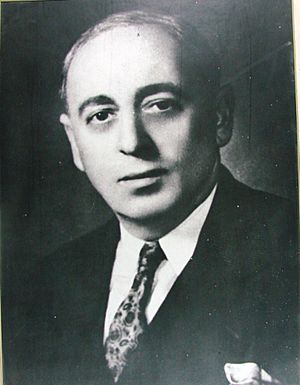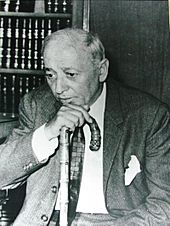Zaki al-Arsuzi facts for kids
Quick facts for kids
Zaki al-Arsuzi
زكي الأرسوزي |
|
|---|---|

al-Arsuzi before 1939
|
|
| Born | June 1899 Latakia, Ottoman Syria
|
| Died | 2 July 1968 (aged 69) Damascus, Syria
|
| Era | 20th-century philosophy |
| Region | Eastern philosophy |
| School | Ba'athism, Arab nationalism |
|
Main interests
|
Politics, philosophy, sociology, nationalism, philology, history |
|
Notable ideas
|
Co-founder of Ba'athism (with Aflaq and al-Bitar), The Genius of Arabic in its Tongue |
|
Influenced
|
|
Zaki al-Arsuzi (Arabic: زكي الأرسوزي, romanized: Zakī al-Arsūzī; June 1899 – 2 July 1968) was an important Syrian thinker. He was a philosopher, a language expert, a sociologist (someone who studies society), and a historian. He was also an Arab nationalist, meaning he believed in the unity and strength of Arab people. His ideas helped shape Ba'athism, a political movement focused on Arab unity and freedom. He wrote several books, with The Genius of Arabic in its Tongue (1943) being his most famous.
Zaki al-Arsuzi was born in Latakia, Syria, into a regular family. He studied in Paris, France, where he became very interested in nationalism. In 1930, he came back to Syria and joined a group called the League of National Action. Later, he started his own political parties, including the Arab Ba'ath. The word "Ba'ath" means "rebirth" or "resurrection," showing his hope for a new, strong Arab world.
However, another group, led by Michel Aflaq and Salah al-Din al-Bitar, also started a similar movement. Even though their ideas were alike, al-Arsuzi's group eventually lost most of its members to Aflaq's group. In 1947, the two groups joined to form one Arab Ba'ath Party. But al-Arsuzi was not part of this new party.
For many years, al-Arsuzi worked as a teacher and stayed out of politics. He returned to the political scene in the 1960s. When Aflaq and al-Bitar left Syria, al-Arsuzi became a key thinker for the Syrian branch of the Ba'ath Party.
Al-Arsuzi believed that Arab countries could become strong and united again. He thought this would happen if Arab people remembered their shared Arab identity. For him, the Arabic language was the most important key to this unity. He felt that Arabic was a very special language, connected deeply to nature and intuition.
Contents
Life Story
Growing Up: 1899–1930
Zaki Najib Ibrahim al-Arsuzi was born in 1899 or 1900 in Latakia, Syria. His family was middle-class. His father, Najib Ibrahim, was a lawyer. When Zaki was young, his family moved to Antioch. He first studied at a religious school where he learned the Quran. Later, he went to a school that gave him a proper Ottoman education.
When Zaki was 15, his father was arrested by the Ottoman government for supporting Arab nationalism. This event made Zaki very interested in politics. His family was sent away for a year but then allowed to return to Antioch.
After World War I, al-Arsuzi studied at a school in Lebanon. Here, he learned about philosophy and became very good at French. He also became known for his ideas that were different from traditional religious views. After finishing school, he taught math in Antioch. Later, he became the head of a school district.
In 1927, al-Arsuzi received a scholarship to study at the Sorbonne University in France. He studied there for three years but did not get a degree. In Paris, he became friends with a French official named Jean Gaulmier. He also became very interested in European philosophy from the 1800s. Thinkers like Henri Bergson and Johann Gottlieb Fichte especially influenced him. These philosophers wrote about the importance of education and the idea of a nation.
Starting the Ba'ath Movement: 1930–1939
Al-Arsuzi came back to Syria in 1930 and taught in Antioch. He found it hard because French authorities controlled Syria and did not want him teaching about European philosophy or the French Revolution. He was even stopped from teaching about ideas like liberty, equality, and fraternity.
In 1933, al-Arsuzi and other Arab nationalists started the League of National Action (LNA) in Lebanon. Unlike many older parties, the LNA had many young members who had studied in the West. Al-Arsuzi led the LNA in Antioch from 1933 to 1939.
When Turkey tried to take over the area of Sanjak of Alexandretta in the 1930s, al-Arsuzi strongly spoke out against it. He became a symbol for Arab nationalists. But in 1939, France gave the area to Turkey. Al-Arsuzi left the LNA soon after.
In 1938, al-Arsuzi moved to Damascus. He was tired of regular party politics. He started a study group with high school students. In this group, he discussed topics like the French Revolution, the Meiji Restoration (Japan's rapid modernization), and the unification of Germany and Italy. He also talked about the ideas of philosophers like Friedrich Nietzsche and Karl Marx.
After leaving the LNA, al-Arsuzi formed the Arab National Party. This party had clear goals for Arab nationalism. But it did not last long. He then went to Baghdad for a short time, hoping to share his ideas there. He returned to Syria disappointed in 1940. On November 29, 1940, al-Arsuzi founded a new party called the Arab Ba'ath.
The Arab Ba'ath Party: 1940–1947
Around the same time, Michel Aflaq and Salah al-Din al-Bitar started their own group, the Arab Ihya Movement. Both groups published pamphlets with similar names. While Aflaq and al-Bitar focused on building their party, al-Arsuzi continued working as a teacher. His party did not have many members.
In June 1941, al-Arsuzi was sent away from Damascus, and some of his members were arrested. The next year, he tried to restart the party, but it failed. By 1944, most of his members had left to join Aflaq's group, which was more active. Al-Arsuzi and Aflaq did not get along well. Al-Arsuzi even accused Aflaq of stealing his party's name.
Al-Arsuzi's interest in politics began to fade. He spent more time studying languages. In 1943, he published his important book, The Genius of Arabic in its Tongue. This book looked at the special features of the Arabic language. People noticed that al-Arsuzi became less social and sometimes seemed to have strange ideas. He faced poverty and difficulties, especially after his mother died.
Al-Arsuzi's popularity also dropped after a coup in Iraq. While Aflaq and al-Bitar supported Iraq, al-Arsuzi thought it was a bad idea. Many of his members preferred Aflaq's more emotional approach. Al-Arsuzi also had a deep distrust of others, which made it hard for his party to grow.
In 1947, Aflaq's group and al-Bitar's group merged to form the Arab Ba'ath Party. Al-Arsuzi was not part of the discussions, and he was not given membership in the new party.
Later Years and Passing: 1948–1968
After returning from Baghdad in 1940, al-Arsuzi taught philosophy but was soon dismissed. From 1945 to 1959, he worked as a secondary school teacher in different cities like Hama and Aleppo. He then taught at a teacher training college until he retired.
In 1963, Hafez al-Assad, a powerful figure in the Ba'ath Party, arranged for al-Arsuzi to help teach Ba'athist ideas to the army. He also made sure al-Arsuzi received a state pension. In 1965, al-Arsuzi was elected to a high position in the Ba'ath Party.
Salah Jadid, another strong leader, wanted al-Arsuzi to replace Aflaq as the main founder of Ba'athist ideas. After the Ba'ath Party split in 1966 into Syrian-led and Iraqi-led groups, al-Arsuzi became the main thinker for the Syrian branch. From 1966 to 1968, he was a personal mentor to al-Assad and Jadid. Zaki al-Arsuzi passed away in Damascus on July 2, 1968.
Al-Arsuzi's Ideas
The Arab Nation
Al-Arsuzi's main idea was the unity of the Arab Nation. He believed that the Arab Nation had deep roots in history, going back to before Islam. He thought that for Arabs to be strong again today, they needed to reconnect with their past. The best way to do this was through language. He saw language as the true link to the old Arab identity.
He believed that Arabs lost their common identity when non-Arabs became involved in their governments. These changes, he felt, weakened the Arab identity. For al-Arsuzi, language was the key to bringing back what was lost and making the Arab identity strong again.
Culture and Language
Al-Arsuzi cared a lot about culture. He even said that to join his group, you had to write or translate a book that helped bring back Arab heritage. He focused on the "linguistic image of Arab nationalism." In 1942, he published Abqariyyat al-'arabiyya fi lisaniha (The Genius of Arabic in its Tongue). This book explored the special qualities of the Arabic language.
Al-Arsuzi argued that the Arabic language is very different from languages like Latin. He believed Latin uses random signs for objects. But Arabic, he said, forms words that sound like their meaning. He felt Arabic was more natural and intuitive. For him, the identity of the Arab Nation was found in the Arabic language itself. He thought the language was the source of the nationalist spirit.
Nationalism
Al-Arsuzi believed that European nationalism grew because of big changes in thinking, society, and economics. He saw the Scientific Revolution, led by scientists like Nicolaus Copernicus and Galileo Galilei, as very important. This revolution changed how people understood nature and led to modern ways of thinking. He quoted René Descartes saying that "Common sense or reason is naturally equal to man." Al-Arsuzi thought that if people were rational, they would want to govern themselves and remove oppressors.
He also believed that modern life came from two things: science and industry. Science removed old superstitions and brought facts. Industry helped create strong, organized societies where liberty, equality, and democracy could last. He pointed to the English Revolution and French Revolution as examples. These revolutions gave people rights and allowed them to control their own lives. This desire for freedom eventually led to nationalism. Al-Arsuzi believed that nationalism showed up in every part of a nation, from laws to art.
His Impact
Al-Arsuzi's work is not widely known in Western studies of Arab nationalism. When he is mentioned, it is usually for his ideas about a unified Arab Nation. Even in Arab studies, his ideas are not often discussed. One reason for this is that his ideas were similar to those of Sati' al-Husri, another Arab nationalist of his time. However, al-Husri was better at explaining his ideas.
Some people say that al-Arsuzi's ideas were too complicated or old-fashioned. He used old words and historical texts, which made his work seem less clear than al-Husri's. Al-Husri also used facts to support his arguments, while al-Arsuzi did not always do this. This made al-Husri seem more informed. Some of al-Arsuzi's ideas were also seen as too extreme or even racist.
Despite this, some Ba'athists, especially from the Syrian branch, say that Michel Aflaq took al-Arsuzi's ideas and claimed them as his own. Hafiz al-Assad, the leader of Syria, called al-Arsuzi the "greatest Syrian of his day." He also said al-Arsuzi was the "first to think of the Ba'ath as a political movement." The Syrian Ba'athists even built a statue to honor al-Arsuzi after the 1966 coup. However, most Ba'athists still believe Aflaq was the main founder of the Ba'ath movement. Some historians think that Ba'athism was really created by a group of three: al-Arsuzi, Aflaq, and Salah al-Din al-Bitar.
Some of His Books
- The Genius of Arabic in Its Tongue (published 1943)
- Al-Umma al-Arabiyya (English: The Arab World, published 1958)
- Mashakiluna al-Qawmiyya (English: Our Nationalist Problems, published 1958)
Images for kids
 | Ernest Everett Just |
 | Mary Jackson |
 | Emmett Chappelle |
 | Marie Maynard Daly |



